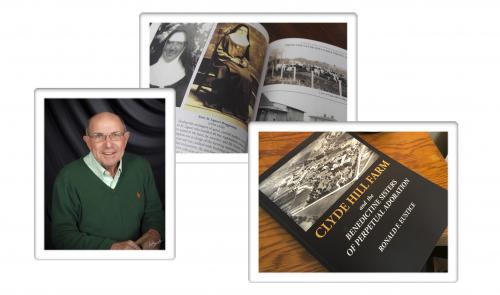PHOTO: Author Ronald F. Eustice has written a new book, “Clyde Hill Farm and the Benedictine Sisters of Perpetual Adoration,” which chronicles the history of the Sisters’ historical influence on subsequent generations of quality dairy cattle herds and life in a convent in the 20th century.
“I didn’t want to write a book just about cows.”
Ronald F. Eustice, author of the recently released “Clyde Hill Farm and the Benedictine Sisters of Perpetual Adoration,” grew up on a farm in southern Minnesota and raised cattle from a very early age. He was in 4H and enjoyed classes in vocational agriculture.
Those experiences led to a degree in agricultural journalism from the University of Minnesota and a career that spanned decades and travel around the globe, working with companies like Carnation and Land O’ Lakes and organizations such as the American Breeders Service (now called ABS Global) and the Minnesota Beef Council.
After his retirement in 2012, Eustice discovered he finally had time to write for fun. And write he did. Combining his incredible knowledge of the cattle and farming industries and the multitude of connections he made during his professional life, Eustice has spent the past decade researching and writing a dozen books that shed light on people and places with interesting and not-oft-told stories about farming and agriculture.
While researching his book, “Gentleman Farmers: Farms & Ranches of the Rich & Famous,” he met Dr. John Underwood of Springfield, Missouri, a fellow writer and expert in Holstein dairy cattle. Their discussion led to the Benedictine Sisters of Perpetual Adoration in Clyde, Missouri, and how the Sisters had developed one of the most successful and impactful Holstein dairy cattle operations during the last century.
“Dr. Underwood mentioned to me that he wished he’d been able to write about the Benedictine Sisters’ Clyde Hill Farm before he had lost his eyesight due to diabetes,” Eustice recalled.
That’s when Eustice decided it would be the topic of his next book. Armed with research from the Missouri Holstein Association, Eustice placed a call to the Sisters’ monastery, and that led to an introduction with Sister Sean Douglas, OSB.
“Sister Sean sent me additional historical photos of the farm and of the Sisters,” Eustice said. “She found information about the Sisters who were in charge of the cattle, who were instrumental in making their Holstein herd one of the top in North America.”
Researchers, writers and journalists have been telling the stories of Clyde Hill Farm for over 70 years, but this is perhaps the most definitive work ever produced on the subject.
“Mr. Eustice’s book is a treasury of different historical sources for the Clyde Hill Farm and is of particular interest to those whose ancestors helped build the farm and work on it,” General Prioress Sister Dawn Annette Mills, OSB said. “The book also shares about the history of dairy farming, the breeding of fine cattle and the role of the farm in our monastic history and how the monastery affected the dairy business. Up until this time, one had to consult several sources for this information. Now it’s all in one place.”
A lifelong Catholic, Eustice was greatly influenced by the Dominican and Notre Dame women religious he knew from his youth, along with a great aunt who was a Franciscan Sister and one of his most treasured mentors.
“I owe a lot to them and what they taught me,” he said.
It was with that same reverence that Eustice approached researching for and writing “Clyde Hill Farm.” He prioritized telling the Sisters’ stories along with their contributions to the world of dairy cattle production. He includes background of the early years of the congregation, how the Sisters built their monastery and of the beginnings of the farm in the early 1900s.
“My goal was to give readers an idea of what it was like to live and to work in a convent at the time,” he said. “No one anticipated their herd would be anything more than something to provide food for the Sisters, hired help and needy people of the area. The Sisters purchased purebreds in 1918, and soon people realized it wasn’t an ordinary herd of cattle.”
In his book, Eustice explores how that extraordinary feat happened and the impact the herd had on subsequent generations of cattle. The Clyde Hill Farm herd was sold privately in 1963, but its influence continued from herds that had acquired Clyde Hill cattle through the years.
“The Sisters were such interesting women,” Eustice said, “and the thought of them out there in full habits during the era of World War II, slogging in the mud, milking and feeding the cattle and taking care of the herd because of the labor shortage just fascinates me and makes for a great story.”
“Clyde Hill Farm and the Benedictine Sisters of Perpetual Adoration” is available for purchase at Amazon. For more information about Eustice and his books, please visit ronaldeusticepublications.com. |



